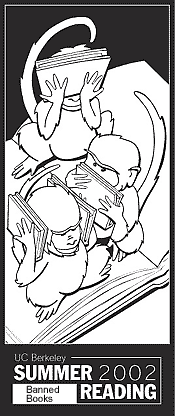Students are being invited to read a dozen "challenged"
novels, books that someone sought to restrict or ban.
The books were chosen by select UC Berkeley faculty
and staff members off the American Library Association's
list of the 100 most challenged books from 1990 to
2000.
| |

|
"And usually when someone doesn't want you to read
something, it means that there's something valuable
in that book," advises the introduction to the list,
distributed this week to fall freshmen.
Steve Tollefson, a lecturer the College Writing Programs
and faculty development coordinator for the Office
of Student Life/Educational Development, helps assemble
the annual reading list. While many of this year's
picks are books entering freshmen should already have
read, he said many students may have missed a few
of them, even such classics as "Tom Sawyer" or "Catcher
in the Rye."
The faculty and staff members - who each offered
a synopsis of and reaction to a book on the list -
contend that each is a must-read.
Charles Stewart, senior photographer in the campus's
Library Photographic Service, strongly recommended
"The Lord of the Flies," an unsettling story of adolescent
boys stranded on an island.
"I read this work only once, as a high school student,
and many of its scenes are as vivid, compelling and
thought-provoking to me today as they were then, so
it seems to be a literary experience that is not to
be missed," Stewart said.
Victor Fischer, associate editor of UC Berkeley's
Mark Twain Project, said "The Adventures of Huckleberry
Finn" has come under fire since it first was published
in 1885. It was the fifth most challenged book from
1990-2000.
"Some of Huck's talk is lulling, some hilarious,
and some deeply unsettling as the reader recognizes
all-too familiar issues of class and culture and racism
that are still a part of American life," Fischer said.
"But most of all, it is a treat to read this book
just for the pleasure of it."
Robert Berring, professor of law and law librarian
at the UC Berkeley School of Law (Boalt Hall), called
Aldous Huxley's "Brave New World" one of the "most
potent combinations of a good read and a disturbing,
thought provoking statement that I know."
The 1932 tale of humanity subsumed by technology
and media is reflected in contemporary news reports,
Berring said. "The questions of government control,
media manipulation and status remain unresolved,"
he said. "Do we have Alphas and Epsilons in our society?
Have we found a drug like soma to help us avoid negative
thinking? Have our governments figured out ways to
keep us passive?"
The
2002 unofficial UC Berkeley Summer Reading List:
1.
"Lord of the Flies" by William Golding
New York: Penguin Books, 1954, (c)1982
2.
"Song of Solomon" by Toni Morrison
New York: Dutton/Plume, 1987, (c)1977
3. "Catcher in the Rye" by J.D. Salinger
Boston: Little, Brown, 1991, (c)1951
4. "Beloved" by Toni Morrison
New York: Dutton/Plume, 1988
5. "Adventures of Huckleberry Finn" by Mark Twain
New York: Viking/Penguin, 1986
6. "The House of the Spirits" by Isabel Allende
New York: Bantam Books, 1986
7. "The Color Purple" by Alice Walker
New York: Pocket Books, 1990
8. "To Kill a Mockingbird" by Harper Lee
New York, NY : HarperCollins Publishers, 1999
9. "Brave New World" by Aldous Huxley
New York: Harper, 1998, (c)1932
10. "The Handmaid's Tale" by Margaret Atwood
New York: Bantam, 1998
11. "The Adventures of Tom Sawyer" by Mark Twain
New York: Bantam Books, 1986
12. "Slaughterhouse Five" by Kurt Vonnegut
New York: Dell, 1991, (c) 1969.
The reading list project is co-sponsored by The Teaching
Library, the Office of the Assistant Vice Provost
for Undergraduate Education, and the College Writing
Programs.
To learn more about the censorship of books, examine
"Banned
Books Online" from the University of Pennsylvania
library or the "Banned
Books Week" page of the American Library Association.